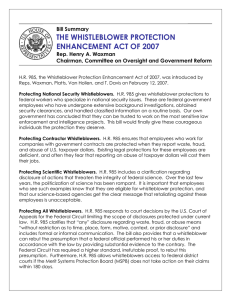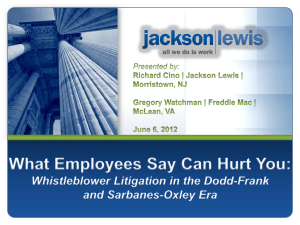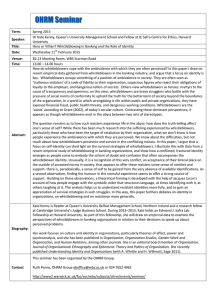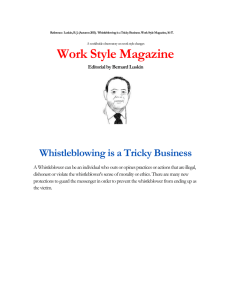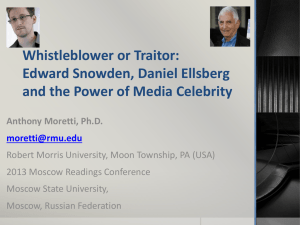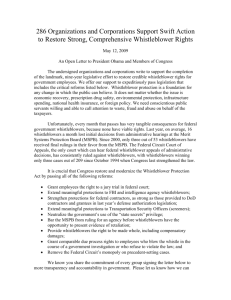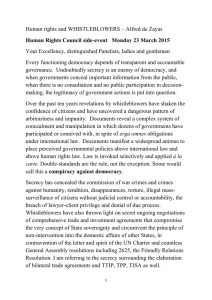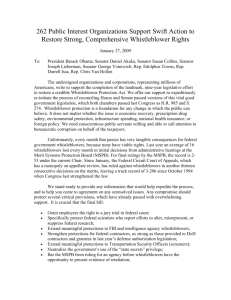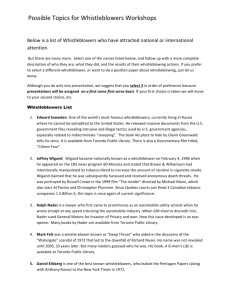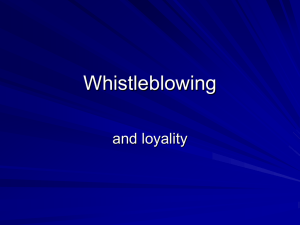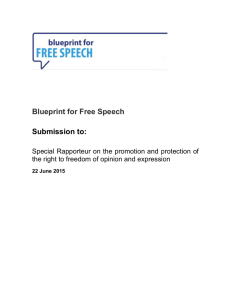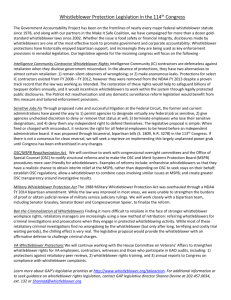Whistleblower
advertisement
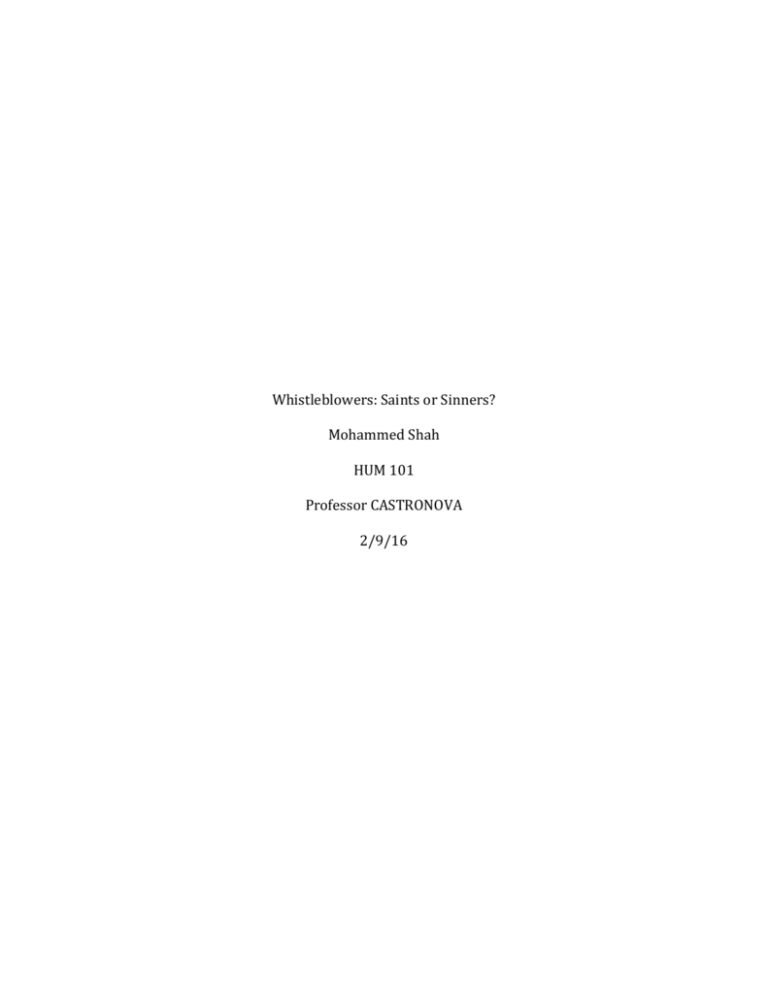
Whistleblowers: Saints or Sinners? Mohammed Shah HUM 101 Professor CASTRONOVA 2/9/16 Shah 1 Private and public organizations have secrets that are priceless. These secrets range from lies and scandals to betrayals. Whistleblowers reveal these secrets; their revelations will benefits the society. Problems arise as society and organizations clash in determining if these secrets should be kept confidential. Whistleblowers have always been in existence for decades while protection for them has not always been the case. They were known as private enforcement during the 13th century. (Bal, 1) Today, they are known for the reporting of a public or private organization for illegal activity on behalf of the government. Whistleblowers are becoming infamous today as they are increasing in numbers. While protection for the whistleblowers has changed dramatically over the past few decades, the origin of their protection can be traced back to 1989. President Reagan passed Whistleblower Protection Act (WPA) in 1989. (Labor Law Journal) This act gave federal employees protection from any retaliation they faced from their superiors. This empowered federal employees, as they were able to bring forth cases that are related to fraud and health, for example. Changes weren’t made to the WPA until 2007. Disclosure, without restrictions was appended to the WPA of 2007. Time, location, or prior disclosure made by any employee or any applicant for employment weren’t restricted to disclosed information. Disclosure was also defined as informal or formal in this act. Major changes were appended to WPA of 2011. Disclosure was defined in the non-exclusion clause. Higher echelon government officials were now required to inform their employees on how to disclose secret information. It also allowed the disclosure of censored evidence only if it related to research, technical or analysis information. (Aallnet.org, 1-3) Shah 2 An employee wouldn’t be protected if he or she reported illegal activity within a company. If the WPA didn’t exist, people might argue. This argument can also be applied to Daniel Ellsberg, who was a United States military analyst, while being employed by RAND Corporation. Ellsberg secretly made photocopies of classified documents with the help of a co-worker. “In 1971, Daniel Ellsberg leaked US government files known as Pentagon Papers.”(Pilger, 36) These documents proved that the invasion of Vietnam was based on lies by the government. People were able to get an insight on why a war was started as a result of the leaks. (DeHaven-Smith, 209) While a variety of laws exist at the federal level, each state has its own regulations when it comes to protecting whistleblowers. New Jersey protects public and private employees from relation from their employers. Employees can disclose acts that violate NJ laws to harming the environment. For example, an employee was fired during this year from Bayonne Medical Center. He made an objection toward a state violation that he noticed. As a result of his objection, he was let go. He won the civil lawsuit and received over $2.1 million dollars in damages. While his personal information remains confidential, it is noted that his reputation in his career field was upheld after winning this case. (Post, 1) Whistleblower benefits from an abundance of laws while companies are regulated heavily without protection from false accusations. These accusations can damage a company’s reputation that took decades to build. A price tag can’t be put on the loss of reputation. Also, innocent employees can be laid off as a result of loss Shah 3 of profit. While the government defends the whistleblowers, companies are left to defend themselves. The media isn’t as friendly toward companies as they are toward whistleblowers. “Some whistleblowers are not deserving of respect because they are, themselves, fraudulent.”(Garrow, 80) Andrew Wakefield is a surgeon and a medical researcher. He had submitted fraudulent documents to the media in 1998. He had claimed that the NMR vaccine had been involved with brain disorders in relation to children. The media sided with Wakefield, even though the department of health refuted the accusation. Medical researchers who conducted medical tests in relating to NMR failed to achieve identical results that of Wakefield. Thus, his documents were deemed false again by the medical society. (Garrow, 80) Pediatricians often become victims even though they treat patients. “The Internet is also making it harder for anyone to be the first and original source of allegations of corporate malfeasance, which can be the basis for a whistleblower or false claims action.” (Sherman, 3) Parents have accused pediatricians of wrongful diagnosis and classified it as an abuse. Communities and social media viewed the reputation of these pediatricians negatively due to the accusations. The Medical Council whom were appointed to protect abuses, end up siding with the accusers even if they were deemed to be false. Jobs were lost due to the mishandling of these cases. The reputations of pediatricians were heavily impacted negatively due to the accusations. (Garrow, 80) Cases can be brought up to support whistleblowers and go against it by employees and organizations. But when it comes to Edward Snowden, America is Shah 4 truly divided along with other nations. Edward Snowden was a former CIA employee. He was also a NSA contractor who had high-level access when it came to classified documents. Snowden copied and leaked thousands of these documents. These documents listed many operations conducted by the US government and its allies. (Pilger, 36) Snowden is hiding in Russia, as a result of these leaks and threats from society and governments. Some people consider Snowden a hero, while others consider him a sinner. Therefore, the question remains: are the world’s whistleblowers saints or sinners? Shah 5 Works Cited 1. Aallnet.org. "Whistleblower Protections." American Association of Law Libraries. Government, Sept. 2011. Web. 2. Bal, Sonny, and Lawrence Brenner. "Recent Court Lawsuits Shed Light on Whistle-blower and Informed Consent." Recent Court Lawsuits Shed Light on Whistle-blower and Informed Consent. N.p., Oct. 2008. Web. 3. DeHaven-Smith, Lance. "Myth And Reality Of Whistleblower Protections." Public Integrity 13.3 (2011): 207-220. Academic Search Premier. Web. 5 Nov. 2013. 4. Pilger, John. "Understanding The Prism Leaks Is Understanding The Rise Of A New Fascism." New Statesman 142.5163 (2013): 36. Literary Reference Center. Web. 5 Nov. 2013. 5. Post, Ashley. "Court Overturns $11 Million False Claims Act Award in Medicare Case." Court Overturns $11 Million False Claims Act Award in Medicare Case. Insidecounsel, 22 May 2013. Web. 6. Sherman, Michelle. "Using The Internet To Your Company's Advantage In Defending Against A Whistleblower Action." Journal Of Internet Law 15.8 (2012): 3-4. Business Source Premier. Web. 5 Nov. 2013. 7. "Whistleblower Protection Act Of 1989." Labor Law Journal 40.2 (1989): 104. Business Source Premier. Web. 3 Dec. 2013.Garrow, J. "Whistleblowers: Heroes Or Traitors." Prometheus 29.1 (2011): 79-81. Scopus®. Web. 10 Nov. 2013.
